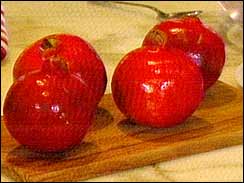Pomegranate Ranked Healthiest Fruit Juice
UCLA Study Lists Top Ten; Health Magazine Contributor Samantha Heller Discusses Them; All High In Antioxidants
NEW YORK, July 5, 2008

Pomegranates (CBS/The Early Show)


Drinking Healthy Juices
“Health” Magazine contributor Samantha Heller underlines some of the healthiest, and unhealthiest, juices to see which products offer the most amount of antioxidants. |
(CBS) Most of us know juice is a healthier drink than sugary soda.
But not all juices are created equal.
Health Magazine is reporting on a UCLA study listing the ten healthiest fruit juices. [To see the list, click here.]
On The Early Show Saturday, Health magazine contributor and clinical nutritionist Samantha Heller talked about what makes the juices healthy.
The study took into account the antioxidant levels of the juices.
Basically, Heller says, anything with a vivid color, like most berries, will be high in antioxidants, so it’s no surprise berry juices landed in most of the top 10 slots.
Oxidants, she explains, are naturally-occurring substances that derive from oxygen. Chemically speaking, oxygen always wants to “mate,” and if it can’t find a mate, it will latch onto anything. As it’s latching onto substances in our body, it can overwhelm them, and cause disease.
Antioxidants, on the other hand, voluntarily bond with molecules of oxygen, preventing them from glomming onto any other substance in our body, and that helps keep us healthy.
And these juices have high levels of antioxidants.
Still, Heller cautions that doesn’t mean you should go overboard with any of them.
There’s always the danger, she points out, that when we tell people something is healthy for them, they’ll go out and drink it by the gallon.
The truth is, you consume a lot of calories with juice. No-sugar-added doesn’t necessarily mean no sugar at all. And sugar, even though it’s naturally-occurring sugar, can really pack on the pounds if you consume too much.
Also, bear in mind that juices sometimes interact with medications in an undesirable way. For example, grapefruit juice interacts with some medications, so you have to be careful.
Another Heller suggestion: Eat the fruit itself if you can, rather than drinking the juice. The fruit has far fewer calories. Remember: It takes ten oranges to make a glass of orange juice, but one orange will be relatively low in calories. Also, the fruit will give you the fiber you need, but the juice won’t. So the fruit is always a better choice than the juice.
If you’re a big juice-lover, and you’re not much of a fruit-eater, Heller says it would be better to get the nutrients the juice has to offer. But to avoid calorie overload, mix it with club soda. You’ll get the taste, with half the calories.
Among the top ten juices:
Pomegranate Juice
Pomegranate is the healthiest of them all because it contains the most of every type of antioxidant. It wins in all categories. And it’s thought that it might do some very good things; it may protect against some cancers, such as prostate cancer. It might also modify heart disease risk factors, and it could be healthy for your heart. So pomegranate was the clear winner.
Concord Grape Juice
Concord grape juice is a source of very potent antioxidants. And there’s some research indicating it may be good for our hearts and also help reduce blood pressure. Grapes are also high in fiber, but much of their goodness is in the seed, so you need to consider whether grape juice is the way to go.
Blueberry Juice
The color alone indicates a lot of antioxidants. But blueberry juice also contains tons of fiber, and is also very high in Vitamin C. One of the qualities of antioxidants is that they can lower inflammation, and so there’s some indication that blueberries may have some effect on age-related cognitive abilities. And don’t forget that blueberries are very low in calories.
Black Cherry Juice
This one actually has scientists a bit excited. Not only is it high in antioxidants, but there is evidence that black cherry juice can actually diminish exercise-induced muscle injuries.
Cranberry Juice
Like all of these juices, it’s high in antioxidants. But cranberry juice is also high in Vitamin C. And there’s always been a sort of wives’ tale that cranberry juice helps prevent urinary tract infections. Well, it turns out researchers are finding evidence that it actually can decrease the number of urinary tract infections. The thinking is, it helps stop bacteria from sticking to the bladder wall, protecting against infections.

